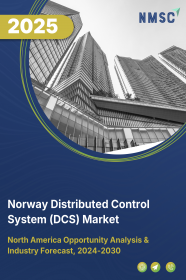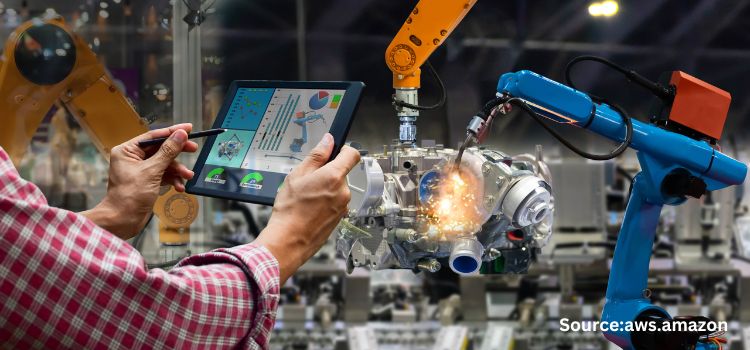
Norway Distributed Control System (DCS) Market by Component (Hardware, Software, and Services) Application (Batch and Continuous Process), by Project Type, (New Construction, Replacement, and Upgrade/Expansion), by End User (Oil & Gas, Chemicals & Refining, Energy & Power, Pulp & Paper, Metals & Mining, Pharmaceutical & Biotech, Food & Beverages, Cement & Glass, Water & Wastewater, and Others) - Opportunity Analysis and Industry Forecast 2024–2030
Industry: Semiconductor & Electronics | Publish Date: 04-Mar-2025 | No of Pages: 155 | No. of Tables: 118 | No. of Figures: 63 | Format: PDF | Report Code : SE841
US Tariff Impact on Norway Distributed Control System (DCS) Market
Trump Tariffs Are Reshaping Global Business
Market Overview
Norway Distributed Control System (DCS) Market was valued at USD 307.44 million in 2023, and is predicted to reach USD 463.12 million by 2030, with a CAGR of 6.0% from 2024 to 2030. A Distributed Control System (DCS) is a computer-based control system widely employed to oversee and automate industrial processes. It comprises a network of controllers distributed throughout industrial facilities, facilitating communication and coordination in the automation of various processes. DCS systems find applications across diverse industries, including but not limited to the chemical, petrochemical, pharmaceutical, food and beverage, and power generation sectors.
These systems are particularly valuable in large-scale industrial processes demanding a high level of automation and control, such as those in oil refineries, chemical plants, and power stations. They serve to regulate and oversee a range of operations, including drilling, refining, blending, manufacturing, filtration, and disinfection, ensuring processes run with precision, efficiency, and safety.
The utilization of DCS systems offers numerous advantages, including enhanced process control, heightened efficiency, and improved safety, along with reduced downtime. DCS achieves this by distributing control functions across multiple controllers, providing redundancy and fault tolerance. This means that even in the event of a controller failure, industrial processes can continue to operate without disruptions.
DCS systems have evolved into indispensable components of modern industrial automation setups, substantially enhancing the reliability and efficiency of industrial processes. Furthermore, they contribute to safety by enabling real-time control and process monitoring. They are capable of detecting potential safety hazards and promptly alerting operators to take corrective measures. DCS systems are also instrumental in predictive maintenance, facilitating proactive maintenance practices that minimize downtime. They collect and analyse data from sensors, offering valuable insights for continuous process improvement.
Powering Norway's Prosperity: DCS in Oil & Gas and Hydro-Power Sectors
Norway is the world's largest producer of oil & gas, and this industry accounts for nearly half of its exports and around 20% of its GDP. In addition to oil & gas, hydro-power is also a major energy sector in Norway, with numerous hydro-power plants located throughout the country.
Thus, DCS helps to monitor and control the flow of oil & gas, regulate pressure and temperature, and ensure that equipment is operating within safe limits. Similarly, in a hydro-power plant, DCS technology can be used to monitor and control the water flow, optimize the generation of electricity, and ensure that the plant is operating efficiently & safely. These factors significantly help to create a huge demand for DCS solutions in the country.
DCS Revolutionizes Industrial Automation: Boosting Efficiency and Reducing Downtime
The growing focus on industrial automation and the adoption of smart manufacturing practices reflect a fundamental shift toward more efficient and streamlined production processes in various industries. In this transformative landscape, Distributed Control Systems (DCS) have emerged as the linchpin, enabling companies to manage intricate operations, enhance overall operational efficiency, and curtail downtime.
DCS solutions provide a centralized platform for real-time monitoring, control, and data-driven decision-making, ensuring that processes run seamlessly and with minimal interruptions. As industries seek to optimize resource utilization and remain competitive, DCS technology has become instrumental in achieving these goals, ultimately driving the march towards more agile, productive, and cost-effective manufacturing.
The Risk Associated with Cybercrimes Hampers the Market Growth in Norway.
DCS systems are inclined to cyberattacks as they are networked and computerized. Cybercriminals can gain unauthorized access to DCS systems, compromise sensitive data, and disrupt critical infrastructure, causing significant financial losses and reputational damage. The consequences of a successful cyber-attack on a DCS system can be severe, especially in industries such as power generation, oil & gas, and chemical processing, where disruptions can have significant environmental and public safety implications.
Modular and Flexible DCS Systems: Unlocking Opportunities for Enhanced Automation.
The introduction of modular and flexible DCS systems can create ample growth opportunities for DCS market. Traditionally, DCS systems have been highly centralized and monolithic, with large-scale installations that are expensive and complex to install and maintain.
However, introduction of modular and flexible DCS systems is changing this paradigm. Modular systems are designed to be more flexible and scalable, with a modular architecture that allows easy integration with other systems and components. This makes it easier to customize DCS systems to meet specific needs of individual organizations, without the need for costly and time-consuming customization.
These systems can help to improve production efficiency, reduce costs, and enhance product quality, which is expected to propel demand for DCS systems across a range of industries, including manufacturing, energy, and process industries.
ABB’s modular-enabled process automation solution that combines an orchestration layer is one of the major examples of modular and flexible DCS system. It also consists of a module layer integrated with module type packages (MTPs) technology for cost-effective modularization. This solution is designed to provide end-users such as mining, pharmaceuticals, and biotech with an automation solution that can fit their applications better than Programmable Logic Controllers (PLCs) and costs less than a traditional DCS.
Competitive Landscape
The Norway distributed control system (DCS) industry includes several market players such as Yokogawa Electric Corporation, Hitachi Ltd., Omron Corporation, Emerson Electric Co., Mitsubishi Electric Corporation, ABB Ltd., Rockwell Automation Inc., Honeywell International Inc., Valmet OYJ, Toshiba Corporation, Schneider Electric SE, General Electrics, Ingeteam Corporation S.A, Azbil Corporation, and Siemens AG.
Norway Distributed Control System (DCS) Market Key Segments
By Component
-
Hardware
-
Controller
-
I/O
-
Workstation
-
Networking Hardware
-
-
Software
-
Service
-
Integration and Implementation
-
Managed Services
-
Support and Consultation
-
By Application
-
Batch
-
Continuous Process
By Project Type
-
New Construction
-
Replacement
-
Upgrade and Expansion
By End User Industry
-
Oil & Gas
-
Chemicals & Refining
-
Energy & Power
-
Pulp & Paper
-
Metals & Mining
-
Pharmaceutical & Biotech
-
Food & Beverages
-
Cement & Glass
-
Water & Wastewater
-
Others
Key Players
-
Yokogawa Electric Corporation
-
Hitachi Ltd.
-
Omron Corporation
-
Emerson Electric Co.
-
Mitsubishi Electric Corporation
-
ABB Ltd.
-
Rockwell Automation Inc.
-
Honeywell International Inc.
-
Valmet OYJ
-
Toshiba Corporation
-
Schneider Electric SE
-
General Electrics
-
Ingeteam Corporation S.A
-
Azbil Corporation
-
Siemens AG
REPORT SCOPE AND SEGMENTATION:
|
Parameters |
Details |
|
Market Size in 2023 |
USD 307.44 Million |
|
Revenue Forecast in 2030 |
USD 463.12 Million |
|
Growth Rate |
CAGR of 6.0% from 2024 to 2030 |
|
Analysis Period |
2023–2030 |
|
Base Year Considered |
2023 |
|
Forecast Period |
2024–2030 |
|
Market Size Estimation |
Million (USD) |
|
Growth Factors |
Growing focus on industrial automation Numerous hydro-power plants located throughout the country. |
|
Companies Profiled |
15 |
|
Market Share |
Available for 10 companies |
|
Customization Scope |
Free customization (equivalent up to 80 working hours of analysts) after purchase. Addition or alteration to country, regional, and segment scope. |
|
Pricing and Purchase Options |
Avail customized purchase options to meet your exact research needs. |

















 Speak to Our Analyst
Speak to Our Analyst




















